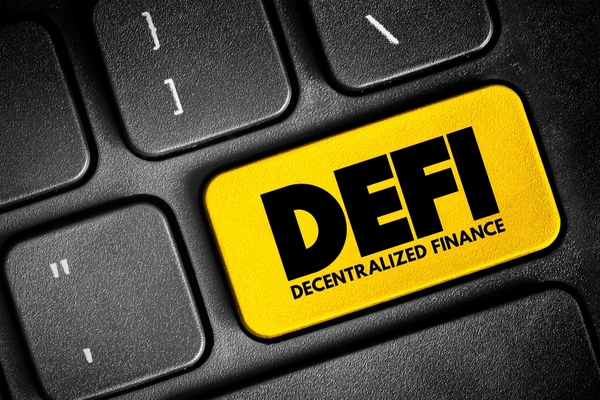Decentralized Finance (DeFi) is revolutionizing the financial landscape by removing intermediaries like banks and financial institutions, offering direct peer-to-peer transactions using blockchain technology. With DeFi, small businesses can access financial services that were previously difficult or costly through traditional systems. From borrowing and lending to seamless global transactions, DeFi provides multiple opportunities for small businesses to thrive in a digital economy.
DeFi operates on blockchain networks using smart contracts, which are self-executing contracts with predefined rules. Unlike traditional finance, which requires businesses to go through rigorous credit checks and approvals, DeFi enables faster, more accessible, and cost-effective financial solutions.
The primary benefits of DeFi for small businesses include:
- Lower Costs: DeFi eliminates intermediaries, reducing fees associated with banking services.
- Greater Access to Capital: Businesses can secure loans without traditional credit scores.
- Global Reach: DeFi transactions work across borders without restrictions.
- Transparency and Security: Blockchain technology ensures transparency and reduces fraud risks.
- Flexible Financial Products: Businesses can earn passive income, hedge risks, or access innovative funding methods.
DeFi Lending and Borrowing
One of the most critical aspects of business growth is access to capital. Traditional banks often impose stringent requirements, leaving small businesses with limited options. DeFi lending platforms offer a game-changing alternative.
DeFi lending platforms allow businesses to borrow funds by using cryptocurrency as collateral. Borrowers receive stablecoins or other digital assets without the need for a bank or intermediary. The process is automated through smart contracts, ensuring security and transparency. Popular DeFi lending platforms for small businesses include:
- Aave: A decentralized lending platform that offers businesses access to capital without a traditional credit score.
- Compound: Allows businesses to earn interest on crypto deposits while borrowing assets.
- MakerDAO: Enables businesses to take loans using their cryptocurrency holdings as collateral.
- Celsius Network: Offers business-friendly lending solutions with high-interest earnings on deposits.
By leveraging blockchain technology and smart contracts, businesses can secure loans with fewer restrictions and enjoy more flexible financial solutions. Below are some key advantages of DeFi lending for small businesses:
- No Need for a Credit Score: DeFi platforms use collateral-based loans, making it easier for new businesses to access funding.
- Faster Loan Approvals: Loans are processed through smart contracts without manual approvals.
- Flexible Repayment Terms: Borrowers can often repay loans at their convenience.
- Lower Interest Rates: DeFi lending can be more affordable than traditional bank loans.
DeFi Payments and Transactions

Small businesses often face high transaction fees and long processing times for payments. DeFi payment solutions streamline transactions, reducing costs and improving cash flow.
DeFi payment gateways facilitate peer-to-peer transactions without the need for banks or third-party processors. Stablecoins (such as USDC, DAI, or BUSD) can be used for transactions, ensuring price stability and reducing volatility. Key DeFi payment platforms for businesses include:
- BitPay: Allows businesses to accept crypto payments and convert them to fiat.
- Ramp Network: Enables seamless fiat-to-crypto conversion for businesses.
- NOWPayments: A non-custodial payment processor for accepting cryptocurrency payments.
- Flexa: A decentralized payment network that integrates with point-of-sale systems.
Advantages of Using DeFi for Business Payments
DeFi payment solutions offer small businesses an efficient and cost-effective way to process transactions. By utilizing blockchain technology, businesses can eliminate intermediaries, reduce costs, and enable seamless global transactions. Below are some key advantages of using DeFi for business payments:
- Lower Transaction Fees: DeFi payments cost significantly less than traditional credit card fees.
- Instant Settlements: Transactions occur in real-time, improving cash flow.
- Global Transactions Without Borders: Businesses can receive payments from international clients without currency exchange complications.
- Reduced Chargebacks and Fraud: DeFi transactions are irreversible, protecting businesses from fraudulent disputes.
Yield Farming and Staking
Beyond lending and payments, DeFi allows small businesses to generate passive income through yield farming and staking. These methods involve using digital assets to earn returns without actively engaging in financial markets.
Yield farming involves lending or providing liquidity to DeFi platforms in exchange for interest or rewards. Small businesses can deposit idle crypto assets into liquidity pools and earn yields over time.
Staking involves locking up digital assets to support blockchain networks and earning rewards in return. Businesses holding cryptocurrencies can stake their tokens to earn passive income. Best platforms for yield farming and staking include:
- Uniswap: A decentralized exchange where businesses can provide liquidity and earn fees.
- Curve Finance: A DeFi protocol specializing in stablecoin liquidity pools.
- Yearn Finance: Automates yield farming strategies to maximize returns.
- Binance Staking: Offers businesses opportunities to stake assets and earn rewards.
Yield farming and staking offer small businesses a way to generate passive income by leveraging idle crypto assets. These methods allow businesses to earn interest or rewards while minimizing manual effort.
- Earn Passive Income: Businesses can put unused capital to work by participating in liquidity pools and staking programs, earning consistent returns over time.
- Liquidity Management: Instead of letting digital assets sit idle, businesses can provide liquidity to decentralized exchanges (DEXs) and earn transaction fees.
- Low Effort, High Reward: Once assets are allocated, yield farming and staking require minimal oversight while still generating revenue.
- Diversification: By participating in multiple DeFi protocols, businesses can spread risk and optimize returns from various DeFi investment strategies.
- Compounding Returns: Many DeFi platforms allow businesses to reinvest rewards automatically, maximizing the potential for compound interest.
- Flexible Withdrawal Options: Unlike traditional investments, many DeFi platforms offer flexible staking and withdrawal terms, providing businesses with more liquidity control.
By integrating yield farming and staking into their financial strategies, small businesses can create additional revenue streams while benefiting from the security and automation of blockchain technology.
DeFi Insurance
DeFi insurance solutions help small businesses manage risks related to smart contracts, platform hacks, and market fluctuations.
DeFi insurance platforms allow businesses to purchase coverage for their digital assets and transactions. In case of smart contract failure or exchange hacks, businesses receive compensation based on their policy terms. Leading DeFi Insurance Providers include:
- Nexus Mutual: Covers smart contract failures and exchange hacks.
- Cover Protocol: Provides peer-to-peer insurance solutions.
- InsurAce: Offers DeFi insurance with low-cost premiums.
- Bridge Mutual: Specializes in decentralized coverage for digital assets.
DeFi insurance offers small businesses a safety net against financial losses associated with smart contract failures, cyber threats, and unexpected market fluctuations. Traditional insurance policies often come with high premiums and lengthy claim processes, whereas DeFi insurance leverages blockchain technology for transparency and efficiency. Here are some key benefits:
- Protects Against Losses: Businesses can safeguard digital assets from cyber-attacks, fraud, and operational failures.
- Ensures Business Continuity: Minimizes financial risks by providing timely compensation in the event of smart contract vulnerabilities or platform breaches.
- Affordable and Transparent: DeFi insurance policies often have lower costs compared to traditional insurers, and terms are easily verifiable on the blockchain.
- Decentralized Claims Processing: Automated claim settlements using smart contracts remove the need for intermediaries, reducing fraud and ensuring quicker payouts.
- Flexible Coverage Plans: Businesses can customize policies to cover specific risks, including protocol exploits, custodial failures, and market disruptions.
By integrating DeFi insurance into their risk management strategy, small businesses can operate more securely in the decentralized financial landscape, ensuring long-term stability and growth.
Smart Contracts and Automation
Smart contracts are the backbone of DeFi, allowing businesses to automate transactions, agreements, and operations securely. By leveraging blockchain technology, small businesses can streamline processes, reduce human errors, and ensure transparency in business dealings. These self-executing contracts operate based on predefined rules, eliminating the need for intermediaries and enhancing efficiency. The benefits of smart contracts for businesses include:
- Automated Payments: Businesses can set up smart contracts to process payroll or supplier payments automatically.
- Transparent Agreements: Reduces disputes and ensures all parties comply with contract terms.
- Faster Business Transactions: Eliminates paperwork and manual approvals.
- Cost Savings: Reduces administrative costs and third-party fees.
DeFi and NFTs
Non-Fungible Tokens (NFTs) provide innovative revenue opportunities for small businesses. NFTs represent ownership of digital or physical assets on the blockchain. Small Businesses Can Use NFTs through using:
- Tokenized Products: Convert physical goods into digital assets.
- Exclusive Memberships: Offer VIP access through NFT ownership.
- Digital Art and Content: Sell branded digital collectibles.
- Loyalty Programs: Reward customers with NFT-based incentives.


